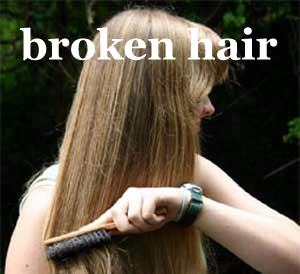5 Ways to Stop Hair Breakage Now
- Posted on
- Comment
1. Trim Your Ends
To some women, trimming equals cutting, which may as well equal “No, Thank You.” Done right, a trim only removes dead ends, not whole chunks of hair. When you trim proactively, you reduce the chances that your ends become so dry and brittle that a cut becomes necessary. Women who suffer from split ends have to cut them away before they break off on their own. When split ends get out of control, they travel up the hair shaft, making a serious cut more likely. Instead, why not trim the bottom 1/4 to 1/2 inch of hair every two to three months? Trims are more even and less traumatic than cuts that have to be done.
2. Don’t Brush Hair While Wet
Just say “no” to brushing your hair when it’s soaking wet. Black hair is already fragile — when wet, it’s in its weakest state. It’s fine to comb through your hair while wet; in fact, the ideal state to comb is when it’s saturated with conditioner. But brushing black hair stretches it sometimes to the point-of-no-return. A loud “snap” is the last thing you want to hear while styling your hair.
What about women who want to straighten their hair before flat ironing? Aren’t round brushes made for this? Brushes are okay once your hair is at least halfway dry, but dryer is better. Instead of a round bristle brush, use a paddle brush to smooth hair, but again, wait until your hair is at least 50% dry before tackling with a brush and blow dryer.
3. Get Some Protein ASAP
Depending on the level of your breakage, a weekly protein strengthening treatment may be perfect, or you may need emergency measures if your hair is breaking at an alarming rate. Usually, chemical damage is behind real breakage emergencies. An intense product like ApHogee Two-Step Protein Treatment can stop a lot of breakage in its tracks, but your hair may still be far from healthy.
It’s important not to overdo the protein because too much can be drying. Alternate mild protein treatments with deep conditioners to keep your hair healthy and prevent breakage down the line.
4. Let Your Stylist Apply Chemicals
Overlapping chemicals is a huge contributor to hair breakage. It can be tempting to apply permanent color and relaxers yourself, especially if you’re trying to save money. It may get pricey to have a stylist perform these services, but when it comes to chemical treatments, it’s worth it to have a professional do it. Save up for relaxer touch-ups and color, but you can do most of your daily hair maintenance yourself. If you follow the recommended chemical service schedule, you should only have a touch-up a minimum of every eight weeks, so it’s not like this is a weekly service.
5. Ease Up on Heat
High heat = damage = breakage. Frequent heat = damage = breakage. See a pattern here? While curling irons, flat irons and blow dryers make our lives easier, allowing us to wear just about any style we can think up, these tools can also cause irrevocable damage when used too often or incorrectly. Constantly “bumping” your ends with an iron will weaken, thin and break them over time. Using heat that’s way too hot even once can break your hair.
Use other methods of styling, such as wet setting on magnetic rollers or Curlformers. Wet wrap the hair for a sleek look, or wet set with braids and twists for cool waves. Save the heat tools for special occasions, and definitely no more than once a week.
about







 (Selorm) |
(Selorm) |  (Nana Kwesi)
(Nana Kwesi)